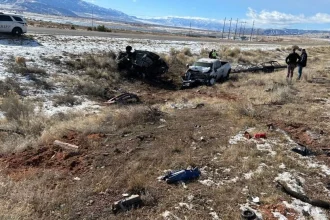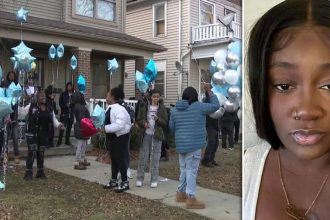D’Asja Barrow — A Vibrant 24-Year-Old Whose Life Was Taken by a Rejected Ex-Boyfriend’s Obsession: Antonio Brown, 36, Faces Multiple Felony Charges in Norwood Court Tragedy
D’Asja Barrow, only 24 years old, was filled with ambition, intelligence, and a determination to build a life of her own making. She was known for her warm personality, her quiet strength, and her desire to move forward with confidence and purpose. Her journey, however, was abruptly and violently halted in the early morning hours of June 3, 2025, in Norwood Court, a small residential municipality in St. Louis County, Missouri.
The man responsible, according to authorities, is Antonio Brown, age 36 — a former partner who could not accept that the relationship between them had ended years prior. Despite D’Asja’s clear boundaries and independence, his fixation escalated over time, culminating in a fatal act that devastated her family, friends, and an entire community.
She Had Let Go. He Refused To.
D’Asja had cut ties with Antonio Brown long ago. For her, the past was in the past. She wanted no connection with the man she had once known. She made it clear she was no longer interested — not in conversation, not in reconciliation, not in anything. She had moved on.
Brown, however, refused to accept that reality.
Instead, he allowed resentment and obsession to consume him. Authorities say he began to display alarming behaviors: following her, appearing where he wasn’t welcome, and attempting to reinsert himself into her life despite her objections. It was not love — it was control. And when that control slipped from his grasp, he responded with violence.
From Stalking to Tragedy
According to investigators, the situation escalated dangerously. What began as unwanted attention turned into ongoing harassment and intimidation. D’Asja, like too many women in her situation, became the target of someone who viewed her autonomy as an offense — someone who interpreted her rejection not as a boundary, but as a challenge.
On the morning of June 3, that fixation reached its irreversible conclusion.
Police allege that Antonio Brown used a firearm during the encounter, and that he later admitted to possessing the weapon, disposing of it after the incident, and fleeing the scene without seeking help or alerting authorities.
He now faces the consequences of his actions, but the damage has already been done — a promising young woman is no longer alive to live out the future she had so clearly envisioned.
The Charges Filed
Following his arrest, Brown was formally charged by prosecutors with the following felonies:
- Second-degree murder
- Armed criminal action
- Unlawful possession of a firearm
He is currently detained on a $300,000 cash-only bond, as legal proceedings move forward. Authorities have emphasized that Brown was not legally permitted to own a firearm, adding yet another layer of tragedy and preventability to this devastating event.
A Pattern That Cannot Be Ignored
D’Asja’s story, as heartbreaking as it is, is part of a broader crisis — one that affects thousands of women across the United States each year. It is a familiar, terrifying narrative: a woman asserts her right to walk away, and a man refuses to respect that decision.
In many of these cases, the warning signs are there: the repeated messages, the surprise visits, the refusal to accept boundaries. And far too often, those signs are downplayed — by friends, by family, by law enforcement, or by society itself.
This is not simply a personal tragedy. It is a public one.
It reflects the danger women face when they assert their independence, especially when they attempt to leave relationships with men who equate rejection with humiliation and love with possession.
D’Asja’s Humanity Must Be Central
Let us not reduce D’Asja Barrow to another case file or another victim of male violence. She was a person — full of life, warmth, potential, and purpose. She had friends who adored her, family members who supported her, and goals that were just beginning to bloom into reality.
Her life was not defined by how it ended but by how she lived — with strength, with dreams, and with the courage to say “no” to someone she no longer wanted in her life. That courage should never be met with violence. It should be honored, supported, and protected.
The Role of Firearms and Entitlement
This tragedy is not just about obsession — it is also about access.
Brown, who was legally barred from possessing a firearm due to prior offenses, was still able to obtain one. As in countless other cases of intimate partner violence, the presence of a gun turned a dangerous situation into a fatal one. Studies consistently show that access to a firearm significantly increases the likelihood of a lethal outcome in domestic violence situations.
But beyond the weapon itself lies an even deeper issue: entitlement.
Too many men view women not as autonomous individuals but as property — relationships as something owed, and rejection as a personal attack. This twisted perspective is reinforced by societal norms that excuse male aggression and overlook women’s safety concerns until it’s too late.
The Aftermath: Seeking Justice, Demanding Change
As the court case against Antonio Brown moves through the judicial system, D’Asja’s loved ones are left with grief that words cannot fully describe. They must now live in a world without her, forever burdened by the loss of someone who should still be here.
Justice in the courtroom may come — and it must — but true justice will only be achieved when society no longer tolerates the conditions that made this tragedy possible. When women can say “no” and walk away without fearing the consequences. When law enforcement takes stalking and coercion as seriously as they take physical violence. When our culture no longer excuses or downplays the warning signs of male entitlement.
Say Her Name. Remember Her Story.
Her name was D’Asja Barrow, and she deserved more than the ending she received. She had every right to choose her own path, to distance herself from a past relationship, and to live her life free of fear.
In remembering her, we must do more than mourn. We must act. We must protect women’s right to autonomy, safety, and dignity. We must challenge the norms that fuel these acts of violence. And we must hold systems accountable for their failure to intervene before lives are lost.
D’Asja’s life mattered. Her voice, her boundaries, and her choices mattered. And though she is no longer here to speak for herself, her story demands that we listen — and that we work, collectively, to ensure that no more lives are lost simply because a woman said “no.”




